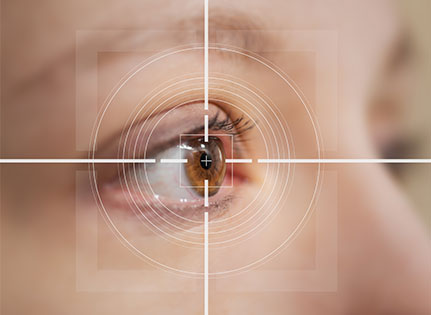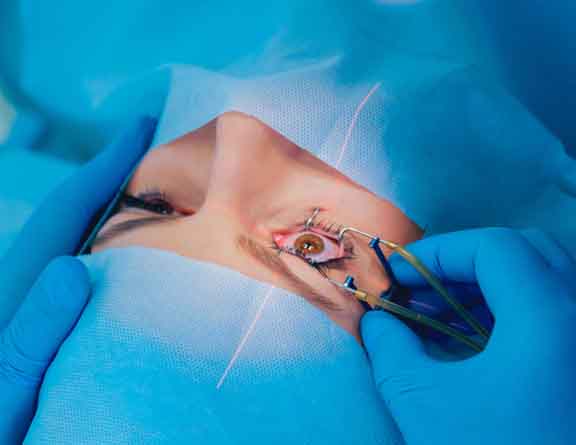How are refractive errors diagnosed?
When you visit an eye specialist or an ophthalmologist to get your eyes checked, they perform a series of tests to evaluate your complete eye health. These tests include-
- Wavefront Analysis measures the refractive power of each eye individually.
- Corneal Topography creates a 3D map of the cornea and divides it into equal parts for precise correction.
- Pachymetry Test is done to measure the corneal thickness. This test helps to determine which is the appropriate thickness for the flap and the amount of tissues that can be removed safely during LASIK.
- Dry Eye Test is done to evaluate what are the chances of developing dry eye syndrome after LASIK. A thin sheet of paper is placed in the eye to check the volume and quality of tears.
- Cycloplegic Refraction Test is done to get your ideal prescription and to calibrate the laser machine accordingly.
Each of these tests has a special significance in determining if LASIK surgery is safe for you. These tests also help to predict the chances of complications after surgery. To learn more about these tests, you can talk to our best LASIK surgeons in Chandigarh.
Who is the right candidate for LASIK surgery?
You should know that LASIK surgery is not suitable for everyone. Many people are not the right candidate due to which they have to opt for alternative techniques, such as PRK, ICL, etc. for vision correction.
There is a well-defined criterion that every LASIK surgeon uses to determine whether a person is a right candidate for LASIK. The criteria include-
- Your eyes must be healthy, i.e., you must not have any underlying eye disease.
- The cornea must have sufficient thickness so that it can be reshaped to correct the refractive error.
- The pupils must not be too large as it can increase post-surgery complications, such as halos, glares, etc.
- Your eye power should be stable for at least one year.
- You must be old enough, i.e., at least 18 years old for LASIK surgery.
- You must not be pregnant or breastfeeding.
The eye specialist will diagnose you thoroughly to confirm that you are a good candidate and that the LASIK treatment is safe for you.
Types of LASIK in Mohali Performed At Pristyn Care
Whether you want to undergo blade LASIK, bladeless LASIK, or premium LASIK surgery, Pristyn Care has all the latest technologies available so that you can choose from the best options.
The different types of LASIK surgery performed by our specialists in Chandigarh include-
- Conventional LASIK is the most common type of LASIK surgery in Chandigarh. It involves using a scalpel to create the flap and then reshaping the corneal tissues by using the excimer laser.
- SBK (Sub-Bowman’s Keratomileusis) is also known as thin-flap LASIK. A very thin flap is created to access the corneal tissues. It preserves the corneal tissues and strengthens them.
- Femtosecond LASIK is a bladeless procedure in which the femtosecond laser is used to create the flap and the cornea is reshaped using the excimer laser. It provides fast visual recovery and provides aspheric treatment as well.
- SMILE (Small Incision Lenticule Extraction) LASIK is another bladeless LASIK surgery that is suggested for people with a high risk of dry eyes. In this type of LASIK, only a femtosecond laser is used to create a lenticule and reshape the cornea.
- Contoura Vision LASIK is the premium type of LASIK where Femto laser, excimer laser, and topolyser are used to correct refractive power, remove corneal aberrations, and provide aspheric treatment. It involves creating a 3D map of the cornea and dividing it into 22,000 points. The laser focuses precisely on these 22,000 points to correct vision problems.
Under the care of Pristyn Care’s LASIK surgeons, you can opt for any of these types of LASIK surgery in Chandigarh and achieve perfect vision.
LASIK Surgery After Care
Pristyn Care doctors provide a detailed recovery guide to ensure that you recover quickly and smoothly. Keep in mind that the outcome of LASIK surgery depends on the aftercare to a great extent. The ideal recovery time is one month during which you will have to take extensive care of the eyes and follow every advice and suggestion given by your doctor.
Some common care tips after LASIK surgery includes-
- Avoid touching or rubbing your eyes as it can cause irritation and displace the flap.
- Use eye drops as directed by the doctor for quick healing and to avoid side effects, such as dry eyes.
- Keep your eyes protected from dust, dirt, UV rays, and even from strong chemicals that produce gas as they can cause irritation in the eyes.
- Do not indulge in physical exercises or any kind of sports that can put a strain on the eyes or damage them.
- Avoid using soap, hair, and makeup products for the first few days after surgery.
- Give your eyes enough rest and don’t watch digital screens, including TV, mobile phone, laptop, etc.
- Do not take showers, bathe in hot tubs, or swim for at least a week.
- Eat a healthy diet composed of fresh fruits, green leafy vegetables, and fiber-rich foods that are beneficial for overall eye health.
- Take regular follow-ups with the doctor to ensure that your eyes are healing properly and there are no signs of potential complications.
To undergo LASIK surgery in Mohali, give us a call and connect with the best surgeons.







.svg)









